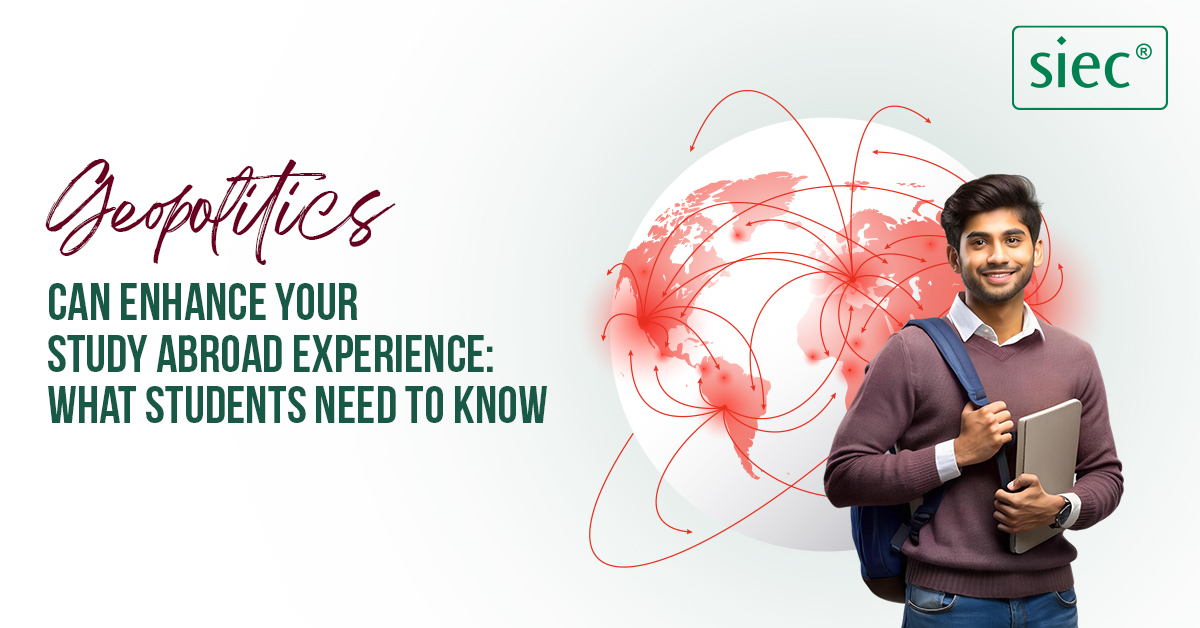
Updated On: 14 July 2025
Geopolitics Can Enhance Your Study Abroad Experience
Chalk up another scenario in escalating modern-day interconnectedness that significantly shapes the landscape of international education: the geopolitical scenario. Thus, whether you are planning to study abroad in the U.S., U.K., Canada, Australia, or Europe, understanding the implications of such geopolitical changes could end up being determinant factors in your academic journey as well as the professional aspect of it.
’’Attend Global Education Fair in 2025 By SIEC’’ and explore the right study abroad options, get a free consultation and on-the-spot eligibility check.
Mark your calendar- 5th July to 20th July
Register yourself here- Global Education Fair
Global shifts may be an opportunity to make wiser decisions and, in general, facilitate your study abroad experience. Let's see how geopolitics influences global education and what students can deduce from such shifts.
Read More: Top 10 Study Abroad Trends to Watch For in 2025
How Geopolitics Can Enhance Your Study Abroad Experience
1. Geopolitical Shifts Affect Study Destination
International relations or geopolitical changes directly affect visa policies, work opportunities, and education systems. Based on international trends coupled with local aspects such as economic conditions and diplomacy, the countries tighten or loosen restrictions on immigration. One such example is:
- The Graduate Route visa, which was reintroduced by the U.K, will allow international students the privilege of living and working in the U.K. for two years after graduation.
- It grows as a huge ground for students because Canada is stretching the arms of its Post-Graduation Work Permit (PGWP) program.
Australia has also been welcoming for students through generous work rights for some industry sectors to help improve its economy.
In this way, students remain aware of the trends that help inform their choices that can be made in application as greatly benefiting all countries.
Also read: Why European Universities lead in affordable education and career growth?
2. New Ways of Life through Economic & Trade Agreement
Economic and trade treaties between countries are the basis for determining the job market and opportunities for students. Such cases are:
Trade relations between India and the U.S. and Australia have developed, opening doors to more educational collaborations, scholarships, and jobs.
Increased demands for professionals have been created as European nations have signed tech deals with India
Growth opportunities were created above which, stem pathways have opened through the QUAD Alliance (U.S., India, Japan, Australia). It has opened doors to exciting careers across the globe for students in STEM fields.
Students need to understand how these economic connections can affect job markets so that they can adjust their study plans to fit with the emergence of world opportunities.
You may like: Australia-India Partnership brings benefits to Higher Education and Research
3. Political Stability Affects Student Safety & Experience
Safety and political stability are the foremost most important determinants when choosing a study abroad destination. The country with a low crime rate, and stable international affairs yield a better environment for students. This should be the recent changes from:
Some European countries have developed extensive student visa policies for students so that they could assure themselves of safety and smooth transitions to their respective countries.
Geopolitical shifts have also revealed the strengthening of student protection policies in the U.S. and the U.K.
New Zealand and Canada are still safest study abroad destinations with their progressive immigration policies.
Geopolitical stability guarantees that students are free to concentrate on their studies without any unforeseen interruptions.
4. Cultural Exchange & Global Networking
The changing geopolitics also affects cultural exchanges as well as student interaction in the global context. Since countries have developed stronger networks in these alliances, the increase of student exchange programs has also led to more cross-national research collaboration. This implies:
More scholarship funding and international students in a few academic disciplines.
Wider cultural interactions and a better study-abroad experience.
Interlinked global internship opportunities and work placement being made possible through collaboration with local organizations.
Those students who will indulge in cultural diplomacy and will network with these students will reaps long-term benefits in their careers.
5. Language & Soft Skills Get Even More Important
With the changes which are happening in a global level, the models of jobs are also being changed. And this effect is reflected in terms of demand for multilingual professionals and those possessing strong soft skills. For instance:
Through these time-tested signals, countries such as Germany, France, and Japan give impetus to the international students in learning the local language. Further, this increases the chance of getting jobs.
Of course, English continues to worry the world but it still remains the international language for doing business. A second language will enhance competitiveness.
Adaptation, cross-cultural communication, and problem-solving skills have become the watchwords of the present workforce.
Students can gain entry into various markets by remaining open to learning new languages and acquiring skills that have global relevance.
You may also interested: UAE rolls out New visa-on-arrival Policy for Indians
6. Scholarships & Funding Opportunities Shifting with Geopolitical Trends
Scholarships and education grants are always dependent on country's international relations. When countries become allies, they offer students from each other's countries more financial assistance. For instance:
Launching Chevening Scholarships sponsored by the U.K. for select countries' students, which covers tuition fees and living expenses.
The Fulbright Program of America has a cultural exchange and research opportunity for students worldwide.
Special scholarships sponsored by Canada and Australia for students of emerging economies.
Following geopolitical trends helps students take maximum benefit of scholarships and other funding opportunities to relieve the burden of studying abroad.
Also know: New Eligibility Requirements for Canada Post Graduation Work Permit Program
7. Dynamic Post-Study Work and Immigration Laws
Hopes are all the more pinned on the ability to work abroad after finishing one's studies. Laws on immigration and post-study work are ever-in-flux and ever-evolving with developments on the geopolitical front. Some of the recent trends are:
Canada's Express Entry System has moved closer to making international graduates favour-eligible for permanent residency.
Australia has plans to extend the post-study work rights to students of healthcare, IT, and engineering.
America is now broadening its STEM OPT Extension by extending opportunity for internships to its international graduates.
Keeping track of these changes will assist students in wise planning regarding future careers.
Conclusion
The world of international education is in perpetual change and, some would argue, the changing face of geopolitics more than any other factor will affect how such education is experienced by any given student. The right place of study, how they managed to get there through scholarships, networking around the globe, or how to think about the careers they will pursue after study involves a good understanding of geopolitics, which can give immense advantages to any student.
So, turning geo-political changes into opportunities will help students make the most of their journey abroad. Whether you really want to study business in America, engineering in Canada, or hospitality in Australia, global trends will make you thrive on the international stage.
Ready to see the world and shape a future without borders?
Start planning your study abroad trip today! Contact SIEC Today !
Read more insightful articles:
A Story of Learning and Growth from India to Australia
QS World University Rankings: Sustainability 2025 Revealed
What career paths are open to international students in France?



Comments (0)
Leave a Comment